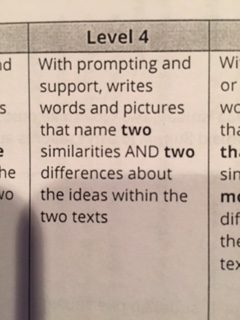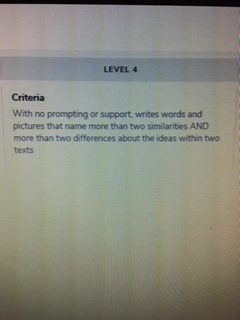Camilla Spadafino, an art teacher in Nashville, offers these thoughts on the Tennessee Fine Arts Portfolio. This portfolio is used in a handful of districts across the state, and an updated version is being piloted by additional districts in the 2018-19 academic year.
Art should never become a standardized process and the TN Fine Arts Portfolio Model is pushing us toward that. When arts teachers are held accountable for checking off boxes, forcing growth, and using standardized measurements in arts classes we are interfering with the creative process. There is a great deal of evidence that despite the effort to standardize and objectify art, the portfolio model scores are wildly subjective making it an invalid, unethical assessment. The TN Arts Portfolio Model seeks to measure and weigh creativity and artistic expression which is counterproductive to the creation of art. The model places an excessive burden of time and energy on teachers that is disproportionate to the complete story of creating and growing a quality arts program.
Among the evidence that the scoring system is invalid: Two teachers submitted the same collection for the “create” domain and one received a five and the other a one. Another pair of visual art teachers co-taught and turned in exactly the same portfolio. One teacher received a four and the other a two. Another art teacher turned in the same portfolio two years in a row and received a four one year and a two the other.
Many visual art teachers have shared that they are cutting and pasting the same narrative from year to year. Many teachers have found that they can simply repeat the same collections with new pictures. This is encouraging “cookie cutter” teaching at worst and busy work for teachers at best. This does not encourage or promote creativity, experimentation, collaboration or risk taking.
Neither the TEAM model nor the Arts Portfolio model is an effective tool for evaluating an arts program. Being a visual art teacher includes managing inventory, advocating for and raising funds, engaging with the community, displaying student work and engaging in collaborations. It’s quite like running a nonprofit organization but without a board or any assistance. Along with all of those responsibilities arts teachers are still planning, assessing, recording, documenting, corresponding and hopefully inspiring and motivating our students. Art will always be subjective and difficult to measure, thank goodness. We need to protect creativity by demanding trust and respect for our field.
The TN Fine Arts Portfolio is taking advantage of teachers’ unpaid time and could be breeding unethical work practices. If testing corporations deserve to be paid millions of dollars for their work creating and measuring assessments, at least our teachers should be paid a few more thousand for their work doing the same. Arts teachers are pouring in days of unpaid time to complete the portfolio and days of unpaid time to voluntarily score other teachers. Besides, volunteer scoring practices don’t seem to be very effective based on the evidence of the large number of discrepancies. If the TN Fine Arts Portfolio System is here to stay we must compensate our teachers for the time they spend creating their portfolios. Perhaps MNPS or the State of Tennessee could make participation optional and partner with researchers from Vanderbilt or another university to study the process for several years. We need to insist that the arts not be about checking off boxes, forcing student growth, or standardized processes. We need to advocate for trust and respect in order for creativity to flourish in our students’ lives and educational experiences.
This is a list of my specific concerns about the Tennessee Portfolio Model:
– Teachers teaching the same lesson, to the same students, using similar photos and narratives got completely different scores. One of the teachers received a 1 and the other a 5
– Two art teachers co-taught the same students the same lessons and entered exactly the same portfolios. One of the teachers was scored a 4 and the other a 2. When the teacher who scored the 2 spoke to the school board he was told “don’t worry about it, it’s just a number that pretty much goes in your file.”
– An art teacher submitted the same portfolios two years in a row received a 4 one year and a 2 the next
– Some teachers are using and are being encouraged by others to use art out of order to when it was created to show manipulated growth
– The process is very time consuming taking teachers 18 or more hours to complete the submission portion of the process, there is an untold amount of time devoted to photographing and organizing the student work
– Teachers are expected and encouraged to complete this work at home, on weekends, and breaks
– The deadline was on a Sunday, further encouraging teachers to spend their weekend working off work hours
– The deadline was the day before the federal tax deadline which is disrespectful
– The new online system requires teachers to upload an unmanageable amount of documents
– The new online system requires teachers to enter a redundant amount of information
– No feedback has been given to promote growth
– No other teachers are required to spend this gross amount of extra time compiling their own assessments, using their own photography equipment and their personal time
– The training was weak and misinformation has been given over multiple years
– The first year the evaluators were told to “throw out the rubric” dissolving trust and disrespecting the teacher who had carefully studied and followed the rubric
– A middle school teacher had to wait to upload one of her collections because the site wasn’t ready. When she went to upload that collection the day it was due she saw that all of her collections had been deleted. She was told that there would not be an extension for re-entering her submission even though the error was not her fault
– The system does not offer a “landing place” where you can view and review your collections before submitting
– The process of tagging is confusing and seemingly unnecessary
– The evaluators are merely volunteers and when I was an evaluator I experienced the overwhelming volume of portfolios to review.
– Because teachers share student artwork online and other art teachers are viewing this artwork, it is easy for a peer reviewer to know whose portfolio they are reviewing making this a biased process
– Art standards are purposefully vague to encourage creative and subjective works of art. Evaluating student work is subjective, even when using specific criteria. When using specific criteria we are teaching students to check off boxes rather than to truly be creative. It is important to use criteria and to balance that multiple solution paths to solve artistic problems.
– The portfolio is measuring aesthetic rather than the process of creating art
Have a story about the Tennessee Fine Arts Portfolio? Email me at andy@tnedreport.com
For more on education politics and policy in Tennessee, follow @TNEdReport




